#Sustainable Development
Explore tagged Tumblr posts
Text
UN & WEF - Sustainable development control plan means.
Corporate control of all Earth’s inventory.
▪️Land
▪️Water
▪️Minerals
▪️Plants
▪️Animals
▪️Construction
▪️Production
▪️Food
▪️Energy
▪️Information
▪️Humans
Corporations & NGO’s supersede you. 🤔
#pay attention#educate yourselves#educate yourself#knowledge is power#reeducate yourselves#reeducate yourself#think about it#think for yourselves#think for yourself#do your homework#do your own research#do some research#do your research#ask yourself questions#question everything#agenda 2030#sustainable development#new world order#news#government corruption#hidden history#history lesson#history
360 notes
·
View notes
Text
A big step forward for clean energy in the PA. ACPMember CCRSolar has completed construction of its 24 MW Erie Solar project in Erie, PA. The solar site will generate an estimated $2.4 million in tax revenues for Erie County over its 40-year lifespan. Take a look at this month’s project celebration with senatorlaughlin.
105 notes
·
View notes
Text
Sustainable Jobs for Autistic People

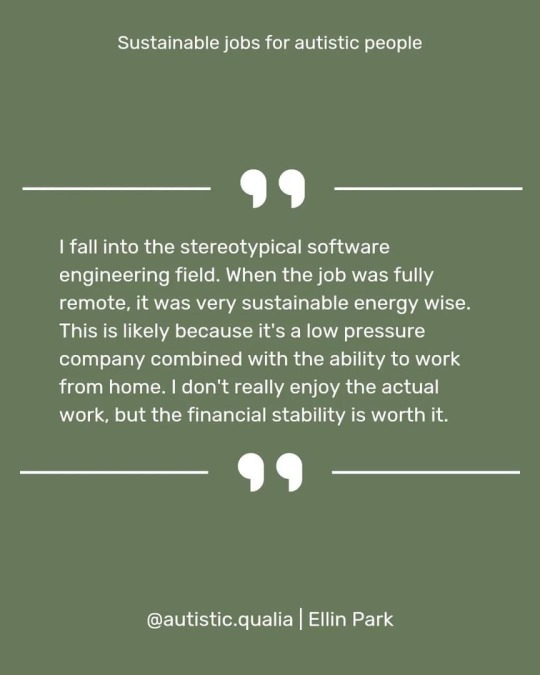
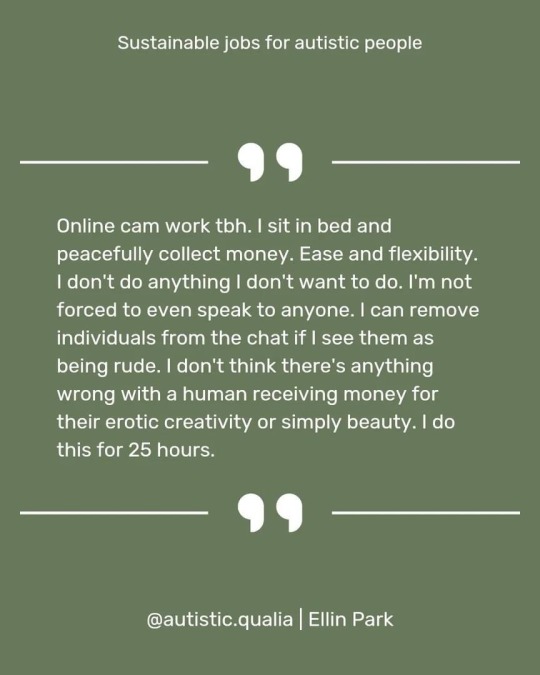

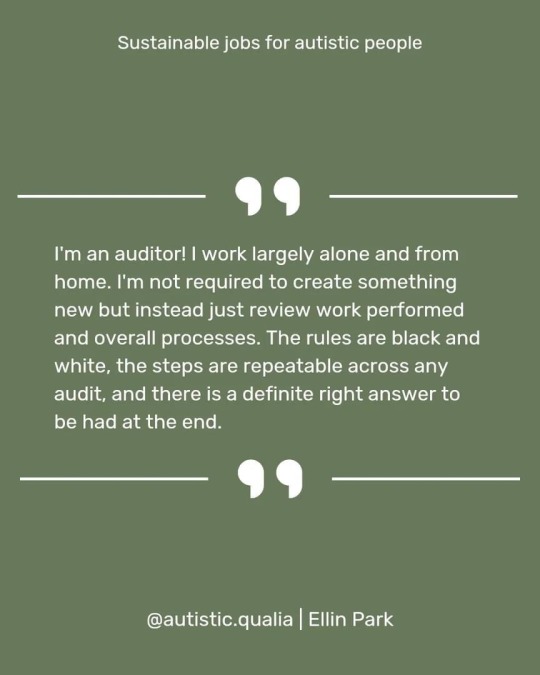
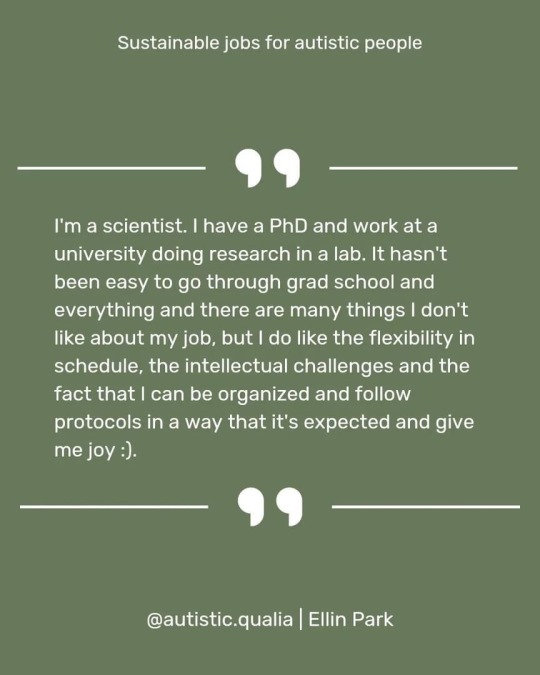
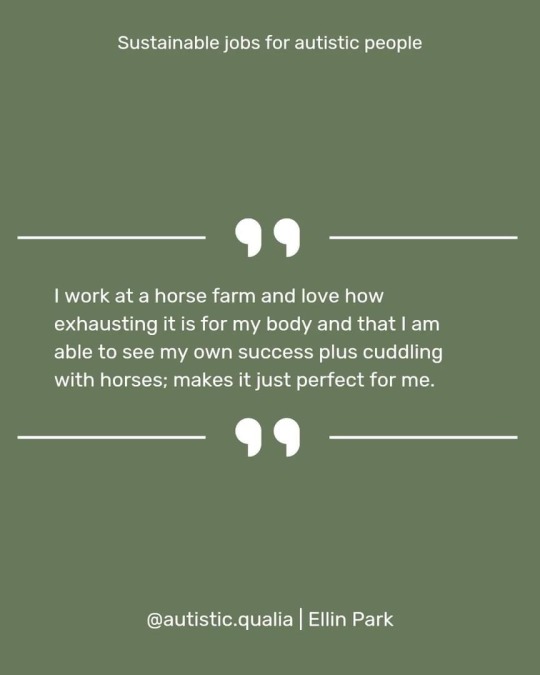
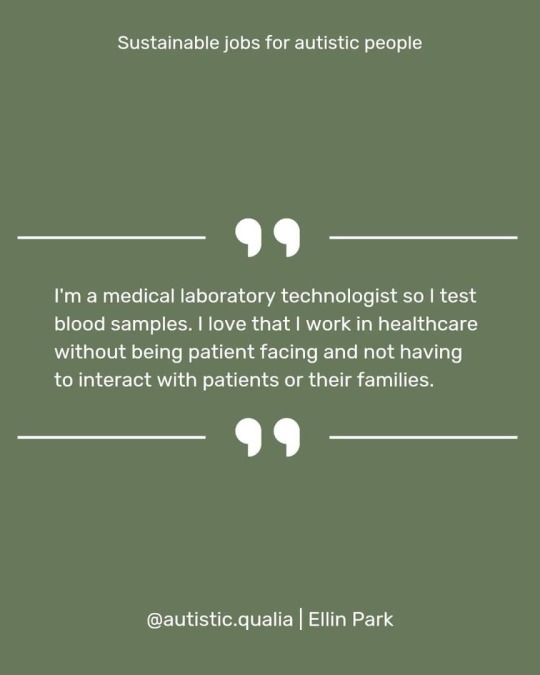
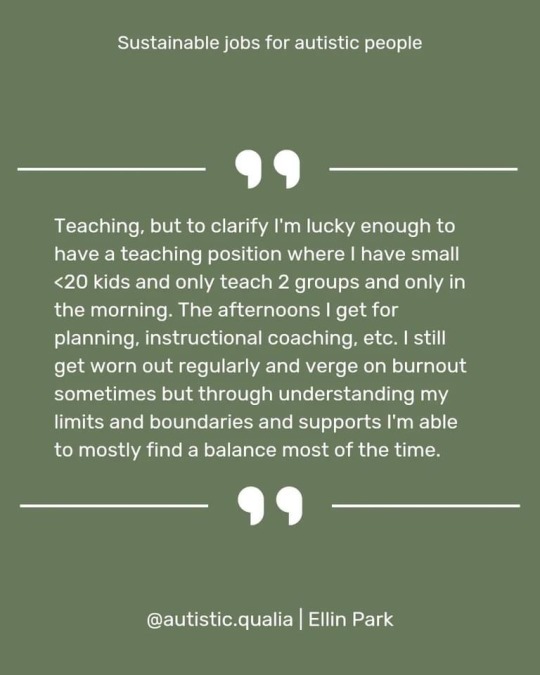
Autistic Qualia
#autism#actually autistic#employment#jobs for autistic people#sustainable development#job hunting#neurodivergence#neurodiversity#actually neurodivergent#feel free to share/reblog#Autistic Qualia (Facebook)
366 notes
·
View notes
Text
What scares you, you want to protect yourself from,
but what you love, you want to protect.
I want to protect landscapes like these and everything they contain.




I am a part of them, and they are a part of me.
What do you want to protect?
Nature conservation fact: Familiarity with nature increases the sense of belonging to it and thus one's willingness to protect it.
#nature#nature appreciation#nature conservation#sustainable development#photography#nature photography#original photography#landscape#forest#sea#field#bog#snow#finland
60 notes
·
View notes
Text
#good news#repurposeing#urban mining#urban design#urban life#sustainability#environmentalism#science#environment#sustainable#sustainable development#Belgium#recycling#construction#deconstruction#demolition
12 notes
·
View notes
Link
Green growth, which is currently the most accepted path to a sustainable future, posits that economic output can continue to expand in a sustainable way by shifting to renewable energy and circular economies. Most governments around the world that recognize the need for climate action promote economic growth through green investment, decarbonized industrial policies and sustainable business practices. But there is growing doubt about whether these strategies will be enough to avert climate disaster. As climate activist Greta Thunberg famously said at the United Nations Climate Action Summit in 2019, “We are in the beginning of a mass extinction, and all you can talk about is money and fairy tales of eternal economic growth.”
This critique of economic growth is not only being made by activists. It is also on the rise in academic research. Green growth is increasingly being challenged on empirical grounds. Indeed, scientific evidence from recent years shows that if the high-emitting countries of the Global North continue to pursue green growth, it is extremely unlikely that greenhouse gas emissions will be reduced at the rate and scale needed to avoid climate collapse. And in an increasingly robust body of scientific literature, ecological economists have identified the limits of the growth paradigm, including the paradox that more efficient use of resources often lowers their costs and thus ultimately leads to greater use.
These ideas have come to be known collectively as “degrowth,” which calls for a planned contraction of economic activity aimed at increasing wellbeing and equality. Degrowth argues that to achieve sustainability, so-called developed countries need to abandon the objective of GDP growth and scale down less necessary and destructive forms of production to reduce energy and material use.
Reducing inequality is often at the heart of policy proposals advanced by degrowth advocates. Among other things, they focus on reducing working time for all and introducing maximum income limits. At the same, degrowth also seeks to improve public services and enable sustainable development globally, through reparations as well as by curbing unequal exchange in international trade.
[...]
A recent paper in Nature summarized five key policy areas at the heart of the degrowth agenda, suggesting ways that countries in the Global North could rapidly reduce emissions while improving social well-being.
First, scaling down those sectors of the economy that cannot be made sustainable in time or mainly serve elite consumption, such as fossil fuels, fast fashion, advertising and aviation. Second, government provision of “universal public services” such as “high-quality health care, education, housing, transportation, Internet, renewable energy and nutritious food.” Third, introducing a green jobs guarantee, mobilizing labor for the ecological transition and improving social care. Fourth, reducing working time to not only lower the carbon emissions of production and stabilize employment, but also to free people to enjoy more time not working. And finally, enabling sustainable development globally by canceling Global South debt, curbing unequal exchange in international trade and ultimately instituting ecological reparations.
111 notes
·
View notes
Text
Computational design on the Biorock Pavilion:
Excerpt from Dezeen article:
The Biorock Pavilion is a concept for an amphitheatre-like event space that could be grown underwater. The form of the building is based on that of a seashell, as well as mathematical forms.
The basis of the pavilion would be a skeletal structure comprised of a network of very thin steel rods, which would be immersed in a solution of minerals.
It would be grown by electrodeposition of minerals
An electric current would then be run through the steel skeleton, allowing the remainder of the pavilion to be 'grown' as the minerals calcify atop the base structure.
"It takes those minerals out of the seawater and produces a structure similar to reinforced concrete," stated Pawlyn. "This uses an absolute minimum of material to grow a whole building."
#biomimicry#biodesign#bio inspired#ecopunk#solarpunk#architecture#sustainable development#sustainable design#computational design#sustainable architecture#Michael Pawlyn#lol if you saw me accidentally post this on my studyblr no you didn't
45 notes
·
View notes
Text
Book of the Day – The Age of Sustainable Development
Today’s Book of the Day is The Age of Sustainable Development, written by Jeffrey D. Sachs in 2015 and published by Columbia University Pres. Jeffrey D. Sachs is a world-renowned economics professor, author, educator, and global leader in sustainable economic development. The Age of Sustainable Development, by Jeffrey D. Sachs I chose this book because I often mention it when I present the…

View On WordPress
#Book Of The Day#book recommendation#book review#businesses#capitalism#carbon emissions#climate#corporations#corruption#deforestation#Economy#education#ethical concern#fossil fuel consumption#global warming#governments#green energy#industrial pollution#inequality#international organizations#knowledge#local communities#politics#Raffaello Palandri#science#Sustainable development#Technology#United Nations#United Nations&039; Sustainable Development Goals
4 notes
·
View notes
Text
Chico Mendes: The Legacy of a Rainforest Guardian
Chico Mendes, a name synonymous with environmental activism and the struggle for the preservation of the Amazon rainforest, remains a beacon of inspiration decades after his tragic assassination. This article delves into the life, activism, and enduring legacy of Chico Mendes, exploring how his efforts have shaped environmental policies and movements around the world. Early Life and the Rubber…
2 notes
·
View notes
Text

1. Support for Local Economies: By purchasing from local food producers, consumers help keep money within their communities. This economic support can lead to job creation and increased economic resilience.
#sustainability#sustainable#sustainable living#local food#ecofriendly#sustainable choice#sustainable development#ecoconscious
2 notes
·
View notes
Text
Clean energy is driving a U.S. manufacturing renaissance: 42 new facilities are online & operating & 119 are under development across America. These domestic manufacturing facilities are spurring the creation of 100,000 good-paying American jobs.
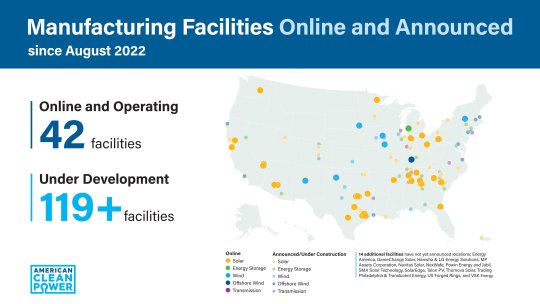
#Renewable energy#solar energy#wind energy#hydroelectricity#bioenergy#geothermal energy#clean technology#energy efficiency#carbon neutrality#sustainable development
91 notes
·
View notes
Text
Comment la ville de Courbevoie est devenue un leader mondial dans la lutte contre le gaspillage alimentaire (par Arash DERAMBARSH dans REVUE POLITIQUE ET PARLEMENTAIRE).
Depuis l’adoption de la loi contre le gaspillage alimentaire, votée le 11 février 2016, les supermarchés ont l’obligation de reverser leurs invendus à des associations caritatives.[1]
Ainsi, cette loi a rapidement prouvé ses effets bénéfiques : plus de 10 millions de repas sont distribués chaque année en France. Cela représente une augmentation de 22 % des dons alimentaires destinés aux associations caritatives.
De plus, nous veillons à la bonne application de la loi.
Accompagnés de lanceurs d’alerte et d’huissiers de justice, nous n’avons cessé d’inspecter les poubelles à côté des supermarchés pour constater les atteintes à la loi.
Après avoir constaté que plusieurs magasins continuaient de jeter les invendus alimentaires à la poubelle, nous avons déposé de nombreuses plaintes à leur encontre. Les procédures fonctionnent et sont un moyen de dissuasion efficace. Sans compter les « Bad buzz » et la mauvaise réputation des magasins récalcitrants.
Mais cela n’a pas suffi et il fallait donc aller plus loin.
Ainsi qui mieux qu’une municipalité pour appliquer la loi contre le gaspillage alimentaire et devenir un laboratoire mondial ?
La ville de Courbevoie a reçu les agents de l’Organisation des Nations Unies pour l’alimentation et l’agriculture (FAO) le 2 vendredi février 2024.
Ils sont venus de Rome pour constater et valider l’officialisation d’un chiffre record : 400 000 repas ont été économisés et redistribués à des associations caritatives pour que les démunis (classe moyenne représentant des mères ou pères célibataires élevant plusieurs enfants, des retraités, des chômeurs ou encore des étudiants) puissent manger à leur faim.[2]
Cette situation sociale démontre d’ailleurs que même dans une ville d’apparence « riche », la pauvreté a de multiples facettes. La pauvreté augmente et la classe moyenne décline.
Ainsi dans un rapport alarmant, le Secours Catholique a estimé que près de 10 % des Français ont recours à l’aide alimentaire.[3]
En effet, « entre 5 et 7 millions de personnes » ont eu recours à l’aide alimentaire en 2020 alerte le Secours Catholique dans son rapport annuel sur l’état de la pauvreté en France publié sur la base des données de la Direction générale de la cohésion sociale (DGCS).[4]
La ville de Courbevoie a donc fait preuve d’inventivité dans sa lutte contre le gaspillage alimentaire.[5]
Depuis 2020, avec son Maire Jacques Kossowski, nous avons lancé une campagne pour mettre fin au gaspillage alimentaire.
En France, le mandat d’un élu municipal est de six ans. L’objectif était donc de faire de notre ville un laboratoire mondial.
Avant toute chose, il convenait de faire un premier constat.
Depuis le 11 février 2016, la règle interdisant le gaspillage alimentaire est limitée aux seuls magasins de plus de 400 m2.
La loi a permis la distribution de plus de 10 millions de repas par an et ses effets positifs se sont immédiatement fait sentir.
C’est en effet une hausse de plus de 22 % d’invendus alimentaires qui sont destinés chaque année aux associations caritatives.
Cette loi a été applaudie dans le monde entier.
Mais au niveau local, il y a encore des marges de manœuvres permettant de faire reculer ce fléau.
En effet, cette loi exonère les deux tiers des supermarché implantés à Courbevoie car leur surface de vente est inférieure à 400 m².
Il a donc été décidé qu’avec l’aide de plusieurs start-up et acteurs sociaux et économiques, une charte contre le gaspillage alimentaire serait votée chaque année dans toutes les sphères d’activité de la ville :
2020 avec tous les supermarchés situés dans la ville sans délimitation de superficie
2021 avec restauration hospitalière
2022 avec restauration scolaire
2023 auprès des commerces alimentaires (commerces de bouche, restaurants, boulangeries, marchés)
2024 avec les maisons de retraite
Ces chartes d’engagement, une première en France, ont un objectif multiple :
Créer des synergies pour que chacun puisse prendre part à ce combat et adapter ses pratiques
Participer à la sensibilisation du grand public à la lutte contre le gaspillage alimentaire
Contribuer à réduire l’impact économique de ces déchets
Mettre en place des partenariats de dons alimentaires en faveur des associations conformément à la loi
Promouvoir les partenariats avec les associations municipales
Organiser des promotions « anti-gaspi », notamment pour les produits proches de la date limite de consommation (DLC)
Proposer des ventes en gros ou à l’unité afin d’adapter les quantités achetées et réduire les emballages
Favoriser le développement des produits frais, et développer des opérations marketing de sensibilisation (opération « Fruits et Légumes Moches », etc.)
Mener une discussion avec les fournisseurs afin de définir une stratégie de contrôle contre le gaspillage alimentaire (chartes qualité des produits, etc.)
Agir pour valoriser les déchets.
Par ailleurs, le 24 octobre 2022, la ville de Courbevoie a organisé une réunion de travail à l’Assemblée nationale dans le but de proposer un amendement à la législation française contre le gaspillage alimentaire. Les députés Karl Olive et Philippe Juvin étaient présents à la réunion.[6]
La proposition était simple : modifier la loi contre le gaspillage alimentaire promulguée le 11 février 2016.[7]
La ville de Courbevoie a spécifiquement proposé les amendements suivants :
Réduire le plafond actuel de 400 m2 imposé aux supermarchés pour le réduire à au moins 100 m2 afin d’inclure plus de 5 000 points de vente supplémentaires.
Augmenter les amendes actuelles de la 5ème classe représentant 10 000 euros à 20 000 euros contre les supermarchés qui continuent de jeter les invendus alimentaires consommables.
Fort de tout ce travail, la FAO a désigné la ville de Courbevoie « Ville verte mondiale » en 2024, lui accordant ainsi une reconnaissance formelle.
Nous appelons ainsi toutes les communes à décliner ces chartes qui ne coûtent rien aux contribuables.
Comme le rappellent les rapports du projet DrawDown (2020) et du GIEC (2022), la réduction du gaspillage alimentaire est l’une des trois principales solutions pour lutter contre le réchauffement climatique.
Nous ne dirons pas que nous n’étions pas informés.
Arash Derambarsh
Adjoint au maire en charge du développement durable dans la commune de Courbevoie
Il est à l’origine de la loi contre le gaspillage alimentaire votée le 3 février 2016 en France. En Suède, en 2019, il a reçu le « WIN WIN Gothenburg Sustainability Award ».
—–
[1] Banque Alimentaire : https://www.ba-81.org/actualites/blog-des-b%C3%A9n%C3%A9voles/323-la-france-pionni%C3%A8re-de-la-lutte-contre-le-gaspillage-alimentaire.html
[2] « Courbevoie lutte contre le gaspillage alimentaire » (BFM TV) : https://www.bfmtv.com/paris/replay-emissions/bonjour-paris/hauts-de-seine-courbevoie-lutte-contre-le-gaspillage-alimentaire_VN-202402050155.html
[3] « Pauvreté en France : 10% de la population a eu besoin d’une aide alimentaire en 2020 » (Université Paris Saclay) : http://www.ritm.universite-paris-saclay.fr/poverty-in-france-10-of-the-population-needed-food-aid-in-2020/
[4] Site Ville de Courbevoie : https://www.ville-courbevoie.fr/2195/lutte-contre-le-gaspillage-alimentaire.htm
[5] The law on Food Waste – From Courbevoie to Assembly : https://resource.co/article/law-food-waste-courbevoie-assembly-10198
[6] « Antigaspillage alimentaire: une proposition de loi pour «aller plus loin» (La Voix du Nord) : https://www.lavoixdunord.fr/1252076/article/2022-11-10/antigaspillage-alimentaire-une-proposition-de-loi-pour-aller-plus-loin
[7] Proposition de loi : https://acrobat.adobe.com/id/urn:aaid:sc:EU:727392be-c20e-4f68-b86d-dcc46fca7193
@arashderambarsh @arash-derambarsh
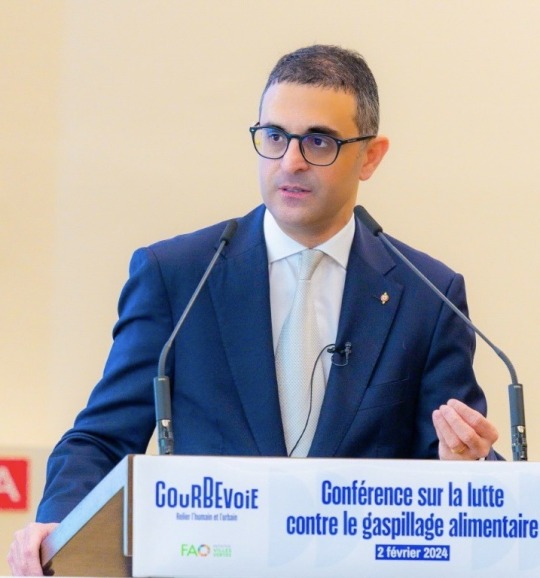
#arash derambarsh#derambarsh#courbevoie#gaspillage alimentaire#arashderambarsh#foodwaste#food waste#ONU#FAO#POLITIQUE#sustainability#développement durable#sustainable development#environment#ecology#food#stop food waste#zéro waste
5 notes
·
View notes
Text
Great Idea 22: Sustainable urbanism

The trend toward complete communities shapes the debate on sustainability and environmentalism, and vice-versa. Read more.
#great ideas#new urbanism#urban design#urbanism#cities#walkability#communities#environment#sustainability#sustainable design#sustainable development
9 notes
·
View notes
Text
#good news#innovation#wind farms#offshore wind farms#seafood#seaweed#sustainable farming#sustainable development#sustainability#biodiversity#environmentalism#science#environment#nature#animals
29 notes
·
View notes
Text

A Reminder for Sustainability
Switching to Reusable Bags can save over 500 plastic bags per person per year.... Think....
Use Reusable bags instead of plastic bags...
Start the day by doing something small for yourself and your planet.
#Manish Pathak#3R Management#solid waste management#waste management#zero waste#save our environment#reusable bags#plastic free#say no to plastic#sustainableliving#sustainability#sustainable development#environment#pollution#environmentalism#India
2 notes
·
View notes
Text
Enhancing CSR Impact through Collaboration with Marpu Foundation
The importance of corporate social responsibility (CSR) is higher than ever in the quickly changing business environment of today. Working together with like-minded organizations is crucial as companies look to improve society and the environment. The Marpu Foundation is one such collaboration that has a great deal of potential to increase the impact of CSR.
At the forefront of social change and sustainable development, the Marpu Foundation | NGO has established itself as a beacon of hope for communities worldwide. With a diverse portfolio of initiatives spanning education, healthcare, environmental conservation, and more, the foundation embodies a commitment to creating a better future for all.
"Marpu" - a synonym for transformation - was established by the respected National Youth Awardee, Mr. Kadiri Raghu Vamsi. Marpu Foundation | NGO focuses on harnessing the potential of individuals to bring about positive change in the world. With a team committed to effecting change and providing a supportive space for all, the Marpu Foundation earned the title of "The Best NGO in India" in 2020.

Emphasizing employee involvement and volunteering is one of the main features of the Marpu Foundation's CSR approach. It has over 80,261 volunteers and over 10,245,120 beneficiaries operating from 39 locations in 15 states. The themes of their work center on environmental sustainability, economic development, social development, and partnership for the goals.
Partnering with the Marpu Foundation not only enhances corporate social responsibility (CSR) efforts but also significantly contributes to advancing Sustainable Development Goals (SDGs). Marpu Foundation's projects are exemplary models of sustainable development, promoting social, economic, and environmental well-being. Here's how partnering with Marpu can boost CSR efforts and support SDGs, illustrated through some of their impactful projects:
1. Education Initiatives (SDG 4 - Quality Education): Marpu Foundation's education initiatives focus on providing quality education to underserved communities. Partnering with Marpu in these initiatives allows corporations to support SDG 4 by investing in programs that enhance access to education, improve literacy rates, and empower marginalized groups. For example, a partnership could fund the establishment of schools in rural areas, provide scholarships for underprivileged students, or support vocational training programs.

2. Clean Water and Sanitation (SDG 6 - Clean Water and Sanitation): Marpu Foundation undertakes projects aimed at ensuring access to clean water and sanitation facilities, particularly in areas facing water scarcity and poor sanitation. Collaborating with Marpu in such projects enables companies to address SDG 6 by funding the construction of water infrastructure, implementing water purification systems, or promoting hygiene awareness campaigns in communities lacking access to clean water and sanitation.
3. Women's Empowerment (SDG 5 - Gender Equality): Marpu Foundation is committed to promoting gender equality and women's empowerment through various initiatives such as skill development programs, entrepreneurship training, and advocacy for women's rights. Partnering with Marpu in these endeavors allows corporations to support SDG 5 by investing in projects that foster economic independence and social empowerment among women, thereby contributing to creating more inclusive and equitable societies.
4. Environmental Conservation (SDG 13 - Climate Action): Marpu Foundation actively engages in environmental conservation efforts aimed at mitigating climate change and preserving biodiversity. Corporations can enhance their CSR initiatives by partnering with Marpu in projects such as afforestation campaigns, sustainable agriculture practices, or renewable energy projects. By supporting these initiatives, companies can align with SDG 13 goals and demonstrate their commitment to environmental stewardship.

5. Healthcare Access (SDG 3 - Good Health and Well-being): Marpu Foundation works towards improving healthcare access and promoting health awareness in underserved communities. Collaborating with Marpu in healthcare projects allows corporations to contribute to SDG 3 by funding medical camps, establishing healthcare centers, or supporting vaccination drives. By investing in healthcare initiatives, companies can help reduce healthcare disparities and improve the overall well-being of communities.
In conclusion, partnering with the Marpu Foundation offers corporations a unique opportunity to bolster their CSR efforts while making meaningful contributions towards achieving the Sustainable Development Goals. Through strategic collaborations with Marpu, companies can address pressing social, economic, and environmental challenges, driving positive change and creating a more sustainable future for all.
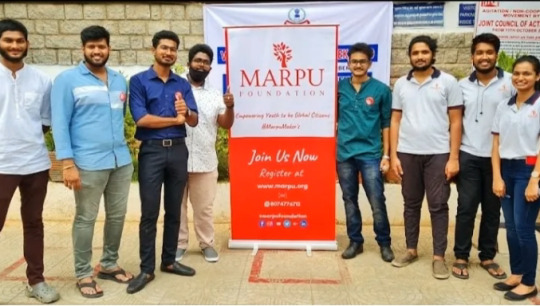
#Enhancing CSR Impact through Collaboration with Marpu Foundation#CSR impact#csr activities#csr#marpu foundation#best ngo in india#sustainable development#volunteering#largest volunteer organisation#quality education#gender equality#good health#economic growth#poverty#inequality#climate action#water and sanitation
2 notes
·
View notes